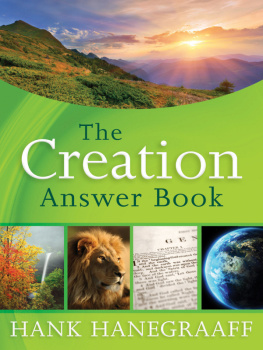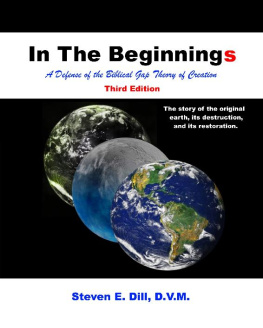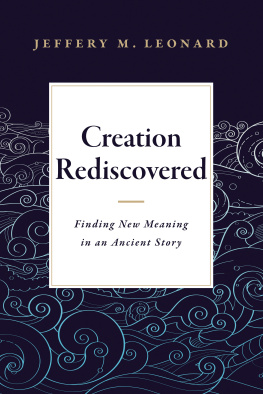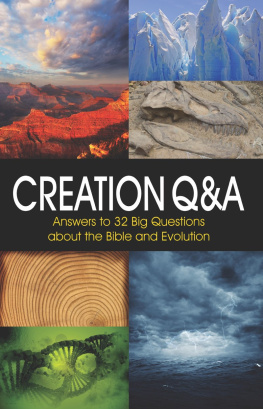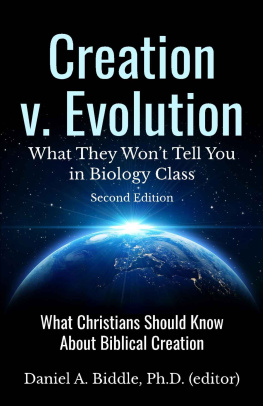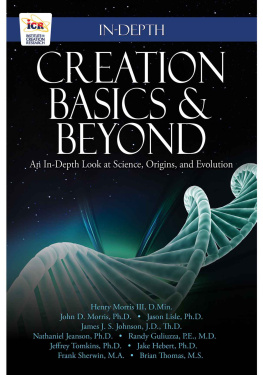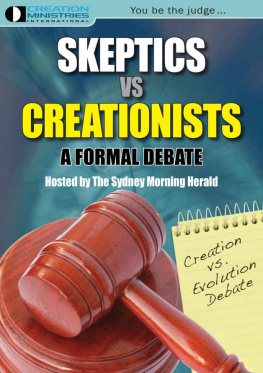Among the Creationists
Among the Creationists
DISPATCHES FROM THE ANTI-EVOLUTIONIST FRONT LINE
Jason Rosenhouse


Oxford University Press, Inc., publishes works that further
Oxford Universitys objective of excellence in research, scholarship, and education.
Oxford New York
Auckland Cape Town Dar es Salaam Hong Kong Karachi
Kual Lumpur Madrid Melbourne Mexico City Nairobi
New Delhi Shanghai Taipei Toronto
With offices in
Argentina Austria Brazil Chile Czech Republic France Greece
Guatemala Hungary Italy Japan Poland Portugal Singapore
South Korea Switzerland Thailand Turkey Ukraine Vietnam
Copyright 2012 by Oxford University Press
Published by Oxford University Press, Inc.
198 Madison Avenue, New York, NY 10016
www.oup.com
Oxford is a registered trademark of Oxford University Press
All rights reserved. No part of this publication may be reproduced, stored in a retrieval system, or transmitted, in any form or by any means, electronic, mechanical, photocopying, recording, or otherwise, without the prior permission of Oxford University Press.
Library of Congress Cataloging-in-Publication Data
Rosenhouse, Jason.
Among the creationists : dispatches from the anti-evolution frontline / Jason Rosenhouse.
p. cm.
Includes bibliographical references.
ISBN 978-0-19-974463-3 (hardcover)
1. Creationism. I. Title.
BS651.R757 2012
231.7652dc23 2011026995
1 3 5 7 9 8 6 4 2
Printed in the United States of America on acid-free paper
To my parents, who taught me the value of
being open-minded but skeptical.
CONTENTS
Just over a decade ago, because of events described in , I developed a strong interest in evolution and creationism. Though this interest was somewhat tangential to my professional work in mathematics, I gradually found it occupying an increasing amount of my time and my thoughts. I indulged my interest in part by becoming a regular attendee at creationist conferences. After several dozen such events over a number of years, I found myself dissatisfied with much of the scholarly literature in this area. I felt there was a story to tell in what I had experienced and that I could paint a realistic picture of why creationists believe the things they do.
This book has three main purposes. It is a memoir recounting some interesting experiences Ive had socializing with people whose worldview differs greatly from my own. It is also an explication of the beliefs and attitudes that are common in the anti-evolution subculture. And it is a discussion of certain questions about the relationship between science and religion that arose naturally through my experiences. The book is structured as follows:
present some relevant biographical information about how I developed my interest in this subject and about my general views toward science and religion.
, with a consideration of how creationists view popular culture, especially as presented in movies and television.
provides a brief discussion of the most significant ID biological argument.
to a celebration of cultural religion.
contains a discussion of one of the greatest areas of tension between evolution and Christianity: the question of human significance. In particular, I focus on the question of whether humanlike creatures can be seen as an inevitable end result of evolution, or whether our appearance was an historical accident unlikely to occur again on a second play of the tape. The final chapters close the book in the same way we started, by focusing on stories and anecdotes.
My conclusions will not be to everyones liking. In particular, I do not agree that evolution and Christianity can easily coexist. My claim is not that there is a flat-out contradiction between the two, but simply that evolution provides enough to disquiet a traditional Christian that it is unsurprising that so many believe they must choose one or the other. Moreover, it is a mistake in my view to think that anti-evolutionism is primarily about an idiosyncratic interpretation of the Bible clung to by a handful of extremists. Of far greater concern are the implications of evolution for human significance, the cruelty of the evolutionary process, and the demise of the traditional design argument. In my conversations with creationists, these are the points, far more than concerns about the age of the Earth or an understanding of Genesis 1, that seem endlessly to recur.
Many people defend theistic evolution, by which I mean a system of thought that accepts both traditional conceptions of God and modern evolutionary science. The literature in support of this view is vast, and we shall only be able to discuss a small portion of it here. I hope, though, that I have given adequate consideration to some of the major lines of argument and have explained why so many anti-evolutionists, not to mention so many nonbelievers, find them unpersuasive.
I have tried to assume as little background as possible, but it has not been practical to assume nothing at all. Thus, I will take for granted a basic familiarity with the stories in the first eleven chapters of Genesis. At times I will refer casually to the days in Genesis 1, to Adam and Eve, to Noahs flood, or to the Tower of Babel, and I will assume that you know what I am talking about. Except where otherwise indicated, all Bible quotations come from the New Revised Standard Version. Also, though I give a brief introduction to the major claims of evolutionary theory in , a reader with absolutely no prior knowledge at all of this subject might find certain sections to be tough going. These sections are few, however, and the most glancing familiarity ought to be sufficient for most of the book.
In certain chapters I present quotations from the speakers at various conferences. You can assume that any quotations presented without an explicit source being given have been transcribed from audio or video recordings of the event. In some cases the speakers were delivering presentations that were also available on DVDs. In some of these cases, indicated in the endnotes, I relied on the DVD version for direct quotations. All of the photographs were taken by me.
I should also emphasize a few things this book is not: First, it is not about presenting the evidence for evolution. I write from the perspective of someone who finds evolution persuasive, but I am not necessarily trying to convince you of that fact in this book. Second, this is not meant to be a comprehensive treatment of creationist claims. I will address a few of their major arguments, but this is not primarily a book of the Creationists say X, but the reality is Y variety.
The evolution/creation issue covers a lot of terrain, some of which is left completely unexplored in my discussions. I make little mention of the politics of school board disputes, for example. Nor do I attempt to formulate clear strategies for moving people away from creationism, or from anti-science views more generally. Proper treatments of those topics would simply require far more space than I can grant them here. For the purposes of this book, I am more interested in understanding the problem than I am in formulating solutions.
Finally, this is not a polemic. By the end of the book, no doubt will be left as to where I stand on a variety of contentious issues, but none of my criticisms should be taken as personally acrimonious towards anyone, including the creationists. I have my opinions, but I do not take it amiss when others disagree with me.
Next page

